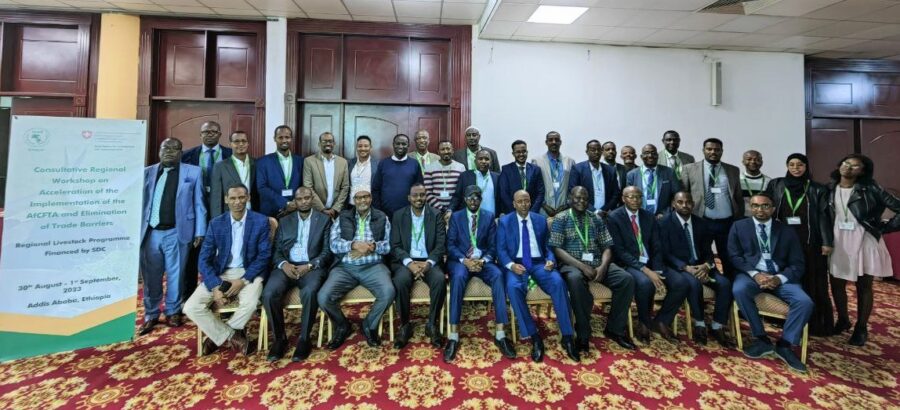August 30, 2023 (ADDIS ABABA, Ethiopia) The IGAD Centre for Pastoral Areas and Livestock Development, with financial support of Swiss Agency for Development and Cooperation (SDC), held a three-day regional consultative workshop on acceleration of the implementation of the AfCFTA and elimination of trade barriers.
In physical attendance were a total of 39 regional stakeholders (36 males and 3 female) while 3 attended virtually. They were drawn from the public and private sector livestock value chain, with representation from the Regional Livestock Programme (RLP) co-partners. Specifically, relevant officers from Ministries responsible for Trade in Ethiopia, Kenya, Somalia and Uganda; livestock and meat value chain representatives; private sector alliances/associations; livestock and meat marketers and traders; clearing and forwarding entities, EAC, UNECA and AfCFTA Secretariat.
During the opening session, the speakers expressed their support for the AfCFTA agreement, its implementation and looked forward to exploiting the benefits once the agreement is fully operationalized.
“It is expected that the full implementation of the AfCFTA agreement will reshape markets and economies across Africa. It will boost output across trade in all sectors, including livestock.” –Dr. Dereje Wakjira, ICPALD Director.
“The AfCFTA is also expected to enhance competitiveness at the industry and enterprise level through exploitation of opportunities for scale production, continental market access and better reallocation of resources.” –Mr. Abebaw Mekonen, Secretary General, Ethiopian Meat Producer Exporters Association (EMPEA).
“The AfCFTA agreement has the potential to make a real and significant change in the living standard of the citizens, boosting intra-African trade and the creation of jobs through the Financial Development Institutions (FDI) and stimulating micro, small and medium (MSME) sized enterprises.” –Representative of Minister of Trade Ethiopia.
IGAD Member States face a number of challenges in AfCFTA implementation such as insecurity and conflict, weak private sector due to weak business environment, narrow export base, poor infrastructure, poor logistics and weak institutional framework. So far, Djibouti, Kenya, and Uganda have ratified the AfCFTA agreement. Somalia, Sudan and South Sudan signed the agreement but are yet to ratify it.
During the plenary and group discussion sessions, key bottlenecks that hinder implementation of the agreement and key enablers for exploitation of the AfCFTA in the livestock sector were identified. The status of national implementation of AfCFTA strategies were reviewed i.e. Kenya, Somalia and Uganda. Key achievements in the implementation process, success stories and lessons learnt were highlighted.
Also in review was the status of policies and frameworks influencing tariff and non-tariff barriers to support harmonization and enhance cross border and continental trade. The question ‘what are the key policies/directives/circulars that need to be harmonized to enhance cross border trade?’ was tackled in detail.
To address the AfCFTA implementation challenges in livestock trade, both public and private sectors need to implement the AfCFTA strategies in a coordinated manner, with a focus on capacity building, resource mobilization and regular experience sharing at various levels. Other suggestions were harmonization of animal sanitary measures, disease control and quarantine centers; harmonization of livestock trading documentation including digitization of customs processes; harmonization of trade taxes/fees/levies to eliminate multiple taxation. (click here for full list of recommendations)
Background
At the 10th Extraordinary Summit of the African Union (AU) held in Kigali (Rwanda), 44 member states of the AU signed a framework agreement – the African Continental Free Trade Agreement – establishing the African Continental Free Trade Area (AfCFTA) agreement. The implementation of the Agreement involves a number of stakeholders playing various roles. Key among these are the bodies created by the Agreement namely: the Assembly, the Council of Ministers, the Committee of Senior Trade Officials, the Secretariat, and the Dispute Settlement Body. At national level, there are a number of government agencies, led by the respective ministries of trade to implement the Agreement. At the regional level, the IGAD Secretariat is expected to create an AfCFTA Unit to take the lead in coordinating and monitoring the implementation of the Agreement. The implementation of the AfCFTA Agreement will need to be monitored and evaluated. This will help in making the strategic policy decisions, necessary to undertake adjustments in the implementation of the AfCFTA. All programmes geared towards the implementation of the AfCFTA will be based on clear goals and objectives, indicators and targets. The monitoring and evaluation framework will be executed at national level and will involve stakeholders in all sectors of the economy – government organs, sector working groups, development partners, implementing agencies, civil society organizations, the private sector, local authorities.
In 2022, IGAD led the development of the AfCFTA Regional Implementation Strategy for the Intergovernmental Authority on Development (IGAD) with technical and financial support of UNECA. This strategy is intended as a framework for implementation of the Agreement by the IGAD Member States. It is a roadmap intended to guide this process. It builds on a number of priority thematic areas where action is needed in order to efficiently and effectively implement the Agreement. The main objective of the strategy is, “To provide a roadmap for implementing the AfCFTA Agreement by the IGAD member states and thereby enable them realize its objectives”.
###
Acronyms:
AfCFTA – African Continental Free Trade Area
EAC – East African Community
UNECA – United Nations Economic Commission for Africa






